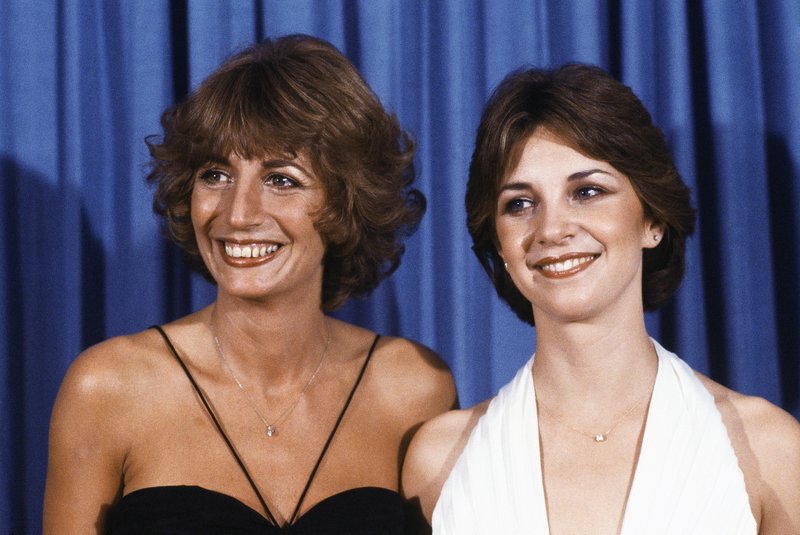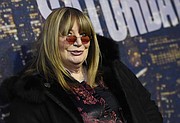NEW YORK -- Penny Marshall, who starred in the top-rated sitcom Laverne & Shirley before becoming the trailblazing director of smash-hit big-screen comedies such as Big and A League of Their Own, has died. She was 75.
Michelle Bega, a spokesman for the Marshall family, said Tuesday that Marshall died in her Los Angeles home Monday night from complications of diabetes. Marshall earlier fought lung cancer, which went into remission in 2013. "Our family is heartbroken," the Marshall family said in a statement.
In Laverne & Shirley, among television's biggest hits for much of its eight-season run between 1976-83, the nasal-voiced, Bronx-born Marshall starred as Laverne DeFazio alongside Cindy Williams as a pair of blue-collar roommates toiling on the assembly line of a Milwaukee brewery. A spinoff of Happy Days, the series was the rare network hit about working-class characters, and its self-empowering opening song ("Give us any chance, we'll take it/ Read us any rule, we'll break it") foreshadowed Marshall's own path as a pioneering female filmmaker in the male-dominated movie business.
"Almost everyone had a theory about why 'Laverne & Shirley' took off," Marshall wrote in her 2012 memoir My Mother Was Nuts. "I thought it was simply because Laverne and Shirley were poor and there were no poor people on TV, but there were plenty of them sitting at home and watching TV."
Marshall directed several episodes of Laverne & Shirley, which her older brother, the late filmmaker-producer Garry Marshall, created. Those episodes helped launch Marshall as a filmmaker.
Marshall's film, Big, was a major success, making her the first woman to direct a film that grossed more than $100 million. The 1988 comedy, starring Tom Hanks, is about a 12-year-old boy who wakes up in the body of a 30-year-old New York City man. The film, which earned Hanks an Oscar nomination, grossed $151 million worldwide.
Marshall reteamed with Hanks for A League of Their Own, the 1992 comedy about the women's professional baseball league begun during World War II, starring Geena Davis, Madonna and Rosie O'Donnell, which made $107.5 million domestically.
More than any other films, A League of Their Own and Big ensured Marshall's stamp on the late '80s, early '90s. The piano dance scene in FAO Schwarz in Big became iconic. Hanks' reprimand from A League of Their Own -- "There's no crying in baseball!" -- remains quoted on baseball diamonds everywhere.
In between Big and A League of Their Own, Marshall made the Oliver Sacks adaptation Awakenings, with Robin Williams and Robert De Niro. The medical drama, while not as successful at the box office, became only the second film directed by a woman nominated for best picture.
Carole Penny Marshall was born Oct. 15, 1943, in the Bronx. Her mother, Marjorie Marshall, was a dance teacher, and her father, Anthony, made industrial films. Their marriage was strained. Her mother's caustic wit -- a major source of material and of pain in Marshall's memoir -- was formative. (One remembered line: "You were a miscarriage, but you were stubborn and held on.")
During college at the University of New Mexico, Marshall met Michael Henry, whom she married briefly for two years and with whom she had a daughter, Tracy. Marshall would later wed the director Rob Reiner, a marriage that lasted from 1971-81.
Marshall's brother Garry coaxed her to move out to Los Angeles in 1967. She studied acting while supporting herself as a secretary -- a role she would later play on Happy Days.
"I just cannot bring myself to accept that the homely person on the screen is me," Marshall told TV Guide in 1976. "I grew up believing an actress is supposed to be beautiful. After I saw myself in a 'Love American Style' segment, I cried for three days. I've had braces put on my teeth twice, but they did no good."
Her last film as director was 2001's Riding in Cars With Boys with Drew Barrymore.
Marshall, a courtside regular at Los Angeles Lakers games, left behind a long-in-the-making documentary about former NBA star Dennis Rodman. When the project was announced in 2012, Marshall said Rodman asked her to do it.
"I have a little radar to the insane," explained Marshall. "They seek me out."
A Section on 12/19/2018

